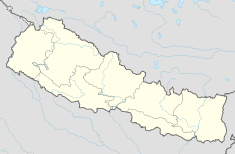Kathmandu Durbar Square
| Kathmandu Durbar Square | |
|---|---|
| Native name Ye Lāyekū (Newar) | |
 Kathmandu Durbar Square | |
 | |
| Location | Kathmandu, |
| Coordinates | 27°42′15″N 85°18′23″E / 27.70415°N 85.30647°E |
| Area | 167.37 ha |
| Built | 4th to 8th century |
| Original use | Royal Palace |
| Architectural style(s) | Newar architecture |
| Website | hanumandhoka |
| Official name | Kathmandu Valley |
| Type | Cultural |
| Criteria | iii, iv, vi |
| Designated | 1979 |
| Reference no. | 121 |
| Region | Asia |
| Session | 3rd |
Kathmandu Durbar Square (Nepal Bhasa: येँ लायकु/𑐥𑐾𑑄 𑐮𑐵𑐫𑐎𑐹, Nepali: हनुमानढोका दरबार; Basantapur Durbar Kshetra) is a historically and culturally significant site in Kathmandu, Nepal. It is one of the three Durbar (royal palace) Squares in the Kathmandu Valley in Nepal that are UNESCO World Heritage Sites.[1]
Although the construction of the square began in the 3rd century, the major structures within it were added in later periods. The outer complex consists of a number of 16th-century temples built during the reign of the Malla kings. These buildings are adorned with meticulously carved facades characteristic of Newar architecture. The central square is surrounded by palace complexes built during the Malla and Shah periods.[2] The most well-known among them is the Nautalle Durbar, a nine-story palace built by Prithvi Narayan Shah to commemorate the Unification of Nepal.[3]
A three-story temple called Kumari Chouk or Kumari Bahal is located at the southern edge of the Durbar square. This Malla-era temple is used by the resident of the Kumari, a young girl worshiped as a living embodiment of the Hindu Goddess Durga.[2]
Earthquake damage
[edit]On 25 April 2015, an earthquake with an estimated magnitude of 7.9 (Mw) hit the region and severely damaged the Square, reducing several buildings to rubble, the most prominent of which was the centuries-old wooden structure, Kasthamandap.[4][5]
See also
[edit]References
[edit]- ^ Kathmandu Valley on list of World Heritage in Danger, UNESCO World Heritage Convention, retrieved 20 November 2024
- ^ a b "Kathmandu Durbar Square". Atlas Obscura. 2019-03-11. Retrieved 2023-06-25.
- ^ Nepal Handbook by Tom Woodhatch
- ^ "Nepal landmarks flattened by the quake". BBC News. Retrieved April 25, 2015.
- ^ Setopati, सुजिता कार्की. "हनुमानढोका दरबार क्षेत्रका अधिकांश सम्पदा पुनर्निर्माण भएनन्". Setopati. Retrieved 20 May 2019.
Further reading
[edit]- von Schroeder, Ulrich. 2019. Nepalese Stone Sculptures. Volume One: Hindu; Volume Two: Buddhist. (Visual Dharma Publications). ISBN 978-3-033-06381-5. Contains SD card with 15,000 digital photographs of Nepalese sculptures and other subjects as public domain.
External links
[edit]![]() Media related to Durbar Square at Wikimedia Commons
Media related to Durbar Square at Wikimedia Commons

